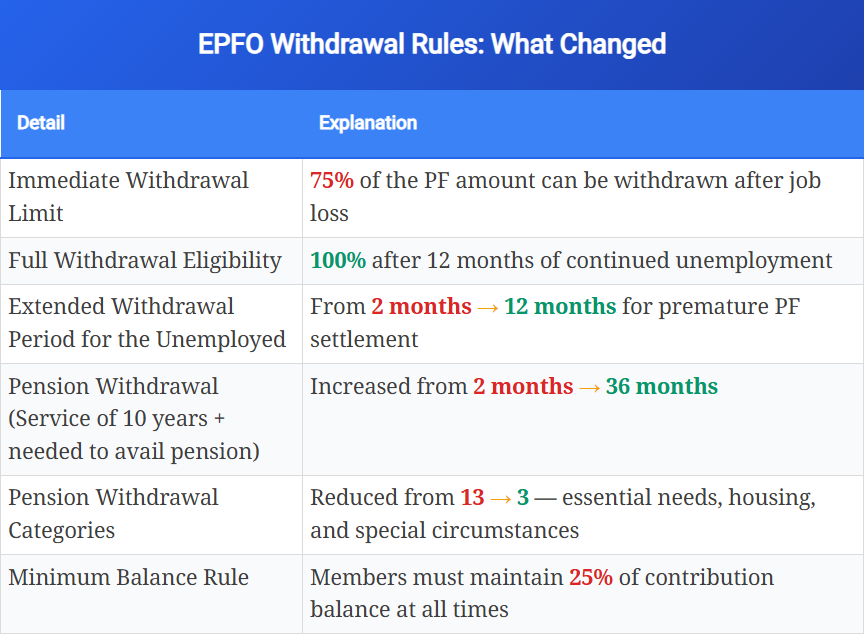EPF New Withdrawal Rules 2025 | 24 Oct 2025
Why in News?
The Central Board of Trustees (CBT) of the Employees Provident Fund Organisation (EPFO) approved new guidelines for partial and premature withdrawal of Provident Fund (PF) funds, aiming to enhance the “ease of living” for subscribers.
What are the EPF New Withdrawal Provisions 2025?
- Simplified Rules: 13 complex withdrawal provisions merged into three categories – essential needs (illness, education, marriage), housing, and special circumstances.
- Employer Contribution: Members can now withdraw from both employee and employer contributions.
- Minimum Balance Rule: Members must maintain at least 25% of their contribution balance at all times, ensuring a financial cushion and long-term security.
- Premature Withdrawal During Unemployment: 75% of PF can be withdrawn immediately after leaving a job.
- Full 100% withdrawal allowed if unemployed for 12 months (previously 2 months).
- The final pension amount can be withdrawn only after 36 months, instead of 2 months earlier.
- The change aims to help members accumulate a sufficient pension corpus by discouraging early full withdrawals, as about 50% of members had less than Rs 20,000 at final settlement.
- Flexibility: Withdrawals for marriage, house purchase, education, illness, or emergencies can now be made earlier and more frequently.
What is an Employees Provident Fund (EPF)?
- About: EPF is a social security and retirement savings scheme for salaried employees in India. It is administered by the Employees’ Provident Fund Organisation (EPFO) under the Ministry of Labour and Employment and is governed by the Employees’ Provident Funds &
- The PF account benefits are extended to all the establishments which employ 20 or more persons.Miscellaneous Provisions Act, 1952.
- Membership: All employees of eligible establishments can become members from the date of joining.
- Membership provides access to Provident Fund (PF) savings, Pension benefits, and Insurance benefits.
- Members must submit a nomination at the time of joining.
- Contribution Structure: Employers and employees both contribute around 12% of wages in contribution accounts.
- Further, the employers also contribute towards administration of the benefits under the EPF & MP Act.
- Funds earn interest declared annually by the Government of India.
- Benefits: EPF provides long-term savings for retirement while allowing partial withdrawals for housing, education, marriage, illness, and special circumstances.
- It ensures financial security for employees and their families in case of resignation, retirement, or death.
- Members can also access online services such as e-passbook, PF account transfer, and claims.
Employees Provident Fund Organisation (EPFO)
- EPFO is a statutory body under the Employees’ Provident Funds & Miscellaneous Provisions Act, 1952.
- It is governed by the tripartite Central Board of Trustees (CBT), comprising government, employer, and employee representatives, chaired by the Union Labour Minister.
- EPFO Administers Three Schemes:
- Employees’ Provident Fund (EPF), 1952, which provides retirement savings.
- Employees’ Pension Scheme (EPS), 1995, which offers pension after 58 years of age for employees with a minimum of 10 years of service.
- Employees’ Deposit Linked Insurance (EDLI), 1976, which provides insurance benefits.
Frequently Asked Questions (FAQs)
1. What is the Employees’ Provident Fund (EPF)?
EPF is a social security and retirement savings scheme for salaried employees in India, administered by EPFO under the Ministry of Labour and Employment.
2. Who can become a member of EPF?
All employees in establishments with 20 or more workers are eligible from the date of joining, providing access to PF savings, pension, and insurance benefits.
3. What schemes are administered by EPFO?
EPFO administers three schemes: Employees’ Provident Fund (EPF), Employees’ Pension Scheme (EPS), and Employees’ Deposit Linked Insurance (EDLI).
UPSC Civil Services Examination, Previous Year Questions (PYQs)
Prelims
Q. With reference to casual workers employed in India, consider the following statements:
1. All casual workers are entitled for Employees Provident Fund Coverage.
2. All casual workers are entitled for regular working hours and overtime payment.
3. The government can by a notification specify that an establishment or industry shall pay wages only through its bank account.
Which of the above statements are correct?
(a) 1 and 2 only
(b) 2 and 3 only
(c) 1 and 3 only
(d) 1, 2 and 3
Ans: D

